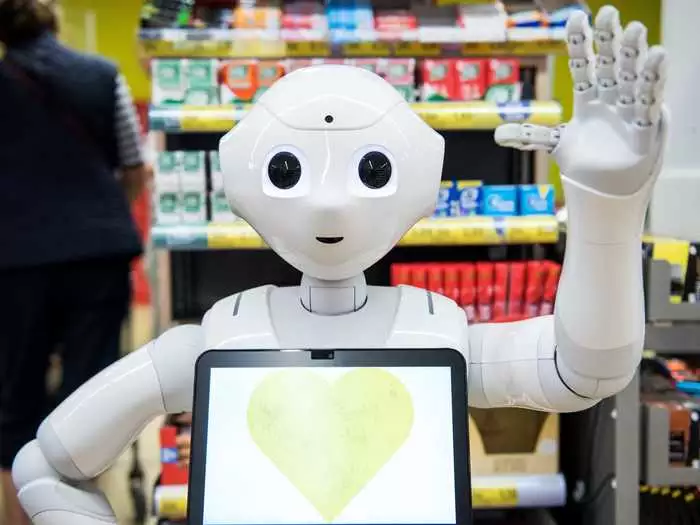How Artificial Intelligence Is Transforming Retail Industry
In this article, we will explore some of the keyways that AI is reshaping the retail landscape in 2023.
How Artificial Intelligence Is Transforming Retail Industry.
The retail industry is undergoing a massive transformation thanks to the power of artificial intelligence (AI). AI is enabling retailers to create more personalized, convenient, and efficient shopping experiences for their customers, while also optimizing their operations and reducing costs. In this article, we will explore some of the keyways that AI is reshaping the retail landscape in 2024.

Personalized Recommendations
One of the most visible applications of AI in retail is personalized recommendations. By analyzing customer data, such as purchase history, browsing behavior, preferences, and feedback, AI algorithms can suggest products and services that match each customer’s needs and tastes. For example, Stitch Fix, an online personal styling service, uses AI to curate clothing items for its customers based on their sizes, styles, and occasions. Stitch Fix claims that its AI-enabled algorithms can generate over 4 billion outfit combinations for each client.
Contactless Shopping and Delivery
Another major trend in retail is contactless shopping and delivery, which has been accelerated by the COVID-19 pandemic. AI is making it possible for customers to pay for and receive goods and services without any physical contact or interaction. For instance, Amazon Go, a chain of cashier-less convenience stores, uses AI-powered sensors and cameras to track what customers pick up and charge them automatically when they leave the store. Similarly, autonomous vehicles and drones are being used to deliver products to customers’ doorsteps or designated locations. According to McKinsey & Company, faster digital connections powered by 5G and the Internet of Things (IoT) could increase global GDP by $1.2 trillion to $2 trillion by 2030.
Also Check Out: YouTube Monetization Requirements & How To Apply 2024
Inventory Management and Optimization
AI is also helping retailers to manage and optimize their inventory levels and supply chains. By using AI to analyze data from various sources, such as sales, demand, weather, events, and competitors, retailers can forecast demand more accurately and adjust their inventory accordingly. This can help them avoid overstocking or understocking, reduce waste, and improve customer satisfaction. Moreover, AI can automate the complex processes involved in inventory management, such as ordering, replenishing, tracking, and auditing. For example, Walmart uses AI-powered robots to scan shelves and identify missing or misplaced items.
Customer Service and Engagement
AI is also enhancing customer service and engagement in retail. By using natural language processing (NLP) and machine learning (ML), AI can understand customer queries and provide relevant answers or solutions. For example, chatbots and voice assistants can handle common customer requests, such as product information, order status, or returns policy. Additionally, AI can generate personalized offers, discounts, or rewards for customers based on their behavior and loyalty. For example, Starbucks uses AI to send personalized messages and offers to its customers through its mobile app.

The Future of Retail with AI
What does the retail look like powered with AI? According to some experts, we can expect to see more innovations that will make shopping more immersive, interactive, and personalized. For example:
- Augmented reality (AR) and virtual reality (VR) will enable customers to try on products virtually before buying them. For example, IKEA let customers see how furniture would look in their homes using AR.
- Facial recognition will allow retailers to identify customers and offer them customized services or promotions based on their preferences or emotions. For example, Alibaba uses facial recognition to let customers pay with their faces.
- Social commerce will allow customers to shop with their friends or influencers online through live-streaming platforms or social media networks. For example, Facebook has launched Shops, a feature that lets businesses create online storefronts on Facebook or Instagram.
The Challenges of Retail with AI
While AI offers many benefits for the retail industry, it also poses some challenges that need to be addressed. For example:
- Data privacy and security will be a major concern for customers who share their personal information with retailers or third-party providers. Retailers will need to ensure that they comply with data protection regulations and ethical standards when collecting and using customer data.
- Human-AI collaboration will be a key factor for success in retail. Retailers will need to balance the use of AI with human skills and judgment and ensure that their employees are trained and empowered to work with AI tools.
- Social and environmental responsibility will be a priority for customers who care about the impact of their shopping choices on society and the planet. Retailers will need to use AI to support sustainable and ethical practices, such as reducing carbon emissions, minimizing waste, or promoting fair trade.
The Opportunities of Retail with AI
Despite the challenges, AI offers many opportunities for the retail industry to grow and thrive in the future. For example:
- Customer loyalty and retention will be enhanced by AI’s ability to create personalized and engaging shopping experiences that meet or exceed customer expectations.
- Operational efficiency and profitability will be improved by AI’s ability to optimize inventory management, supply chain, pricing, and marketing strategies.
- Innovation and differentiation will be driven by AI’s ability to enable new products, services, or business models that cater to customer needs and preferences.
AI is not only transforming the retail industry in 2023, but also shaping its future. Retailers who embrace AI and use it wisely will be able to create more value for their customers, employees, and stakeholders, and gain a competitive edge in the digital age.

Conclusion
AI is transforming the retail industry in 2024 by creating more personalized, convenient, and efficient shopping experiences for customers, while also optimizing operations and reducing costs for retailers. AI is enabling retailers to leverage customer data to provide tailored recommendations, offer contactless shopping and delivery options, manage and optimize inventory levels and supply chains, and improve customer service and engagement. As a result, AI is becoming a key competitive advantage for retailers who want to stay ahead of the curve in the digital age.
That concludes our article on How Artificial Intelligence Is Transforming Retail Industry.
Continue Reading: Best Survey Websites to Earn Money Online; Beer Money 2024

